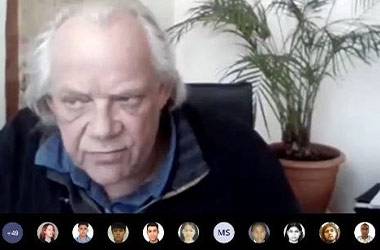Project Week: Turning Crisis into Opportunity
Project Week: Turning Crisis into Opportunity
https://www.wittenborg.eu/project-week-turning-crisis-opportunity.htm

Students Compete for Fellowship Opportunity as Part of Latest Project Week
For their latest Project Week, students at Wittenborg University of Applied Sciences got to examine the skill of turning a problem into an opportunity and moving from risk to resilience through the lens of COVID-19. Students who write the most original essay on the questions posed to them will be awarded Junior Fellowship status in the 20/20 Vision Program and Network.
The programme is an international and transdisciplinary project stretching from 2020 - 2025 where participants collect and review lessons learned on strengthening the resilience of critical infrastructure before, during and after a crisis – such as COVID-19. The project is the brainchild of founder Prof. Eelco Dykstra, and Wittenborg senior lecturer Bert Meeuwsen is a senior fellow.
The idea is to link international business, the economy, with international emergency management. Dykstra explained in an earlier paper that the crucial role of the private sector in preparing for, responding to and recovering from any conflict or crisis remains underexposed and under-explored. "The prime reason for this lies in its complexity. In an increasingly global society many more and different actors (or sectors) need to be considered while they act amidst greater interdependence and increased vulnerability.
"The risks we're currently most concerned about (pandemic, climate change, mass migration, armed conflict, cyber security, etc.) all lead to the same consequence: a disrupted system of essential services and our critical infrastructure. (Afterwards) the wise option would be not to "build back" based on past risk, but to build better to create resilience for the future. How do we do this? Simple. By implementing lessons learned from past conflict or crisis."
Earlier this month Dykstra presented an online guest lecture to students whereafter they had to pitch their ideas. This was done via a poster presentation and a video presentation.
Students had to answer questions such as:
- What are the "roadblocks" standing in the way of putting lessons learned from the past into practice?
- Is the combination of data and information the same as "wisdom"?
- How can we combine real-life experience with paper-based or lab-based science?
- Does managing a crisis require a willingness to abandon standard protocol and an uncanny ability to improvise?
- Is it true that the first victim in any crisis is "truth"?
- Can one really manage a crisis with a "business-as-usual" mindset?
WUP 18/3/2021
by James Wittenborg
©WUAS Press
409 words